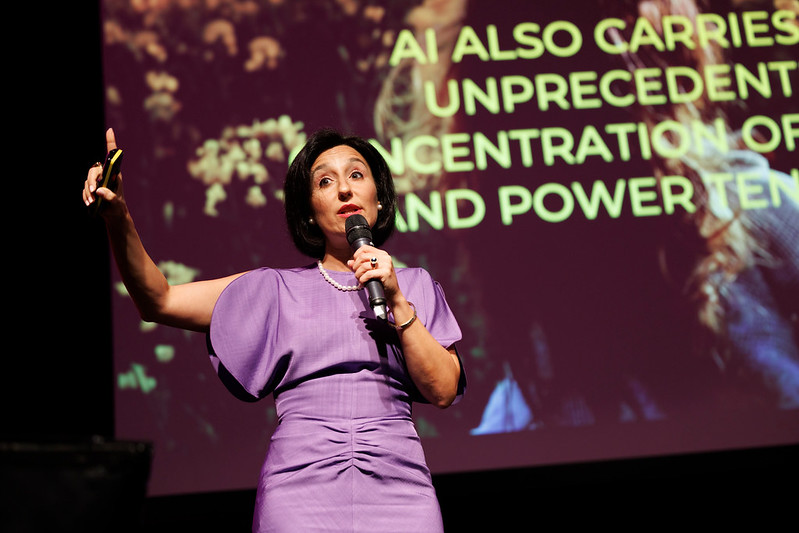Dr. Alessandra Sala. Picture by Andres Poveda.
The Diversity in Tech Awards, in partnership with JP Morgan, took place in the RDS Concert Hall, Dublin on 19 September. Dr. Alessandra Sala, a pioneering computer scientist, was presented the Grace Hopper Award. She addressed attendees in a keynote on AI.
Tech leaders with a strong penchant for diversity, equity and inclusion gathered at the RDS Dublin on 19th September to celebrate the annual DITA Awards, in partnership with JP Morgan.
Hosted by Tracey Carney, Managing Director of Catalyst Media, who sported a bespoke dress by Irish designer Helen McClinden, the awards honoured those working in the tech sphere who have dedicated considerable time and effort to make the sector more equitable.
Dr. Alessandra Sala, a globally recognised leader in AI and data science, with a deep commitment to cultivating diversity in technology ecosystems, was presented the Grace Hopper Award. She addressed attendees in a keynote on cultivating a diverse ecosystem in AI.
Social Tension and Bias
Dr. Sala opened her keynote by discussing an AI image generated by Danielle Baloyi, who partook in the competition ‘The Canvas of The Future,’ at the AI summit held in the UN. The image features a young girl clutching a globe, with an explosion of colour in the background.
Pictured: Dr Alessandra Sala discussing an AI image generated by Danielle Baloyi. Picture by Andres Poveda.
“[Baloyi] boldly spotlights the need to tackle gender and racial inequality and to ensure that we uplift marginalised communities and ensure that no one is left behind in shaping our common future,” Dr. Sala said.
Dr. Sala continues by saying that AI has the transformative power to propel us in the future, “but it comes with important responsibility.”
“How do we want our planet to look, and how we imagine the life of our future generations … [AI] carries a unique concentration of social and power tension.”
Dr. Sala cites Gregory Bateson, a notable anthropologist whose theories of social tension, she said, helps frame conversations of bias in AI: “The men versus the women, the first world versus the other world … the nature versus innovation.”
She continues: “There is an interesting synergy and concentration of those tensions that amplify social inequality that have the possibility to fracture our social structure and influence global dynamics.”
Gender Bias
Technology has gender bias, says Dr. Sala. So, what does that mean?
When AI images are generated, and users input prompts for ‘highly-paid jobs’, Dr. Sala says: “We usually prefer to represent men … and when we try to represent social workers or a housekeeper, we see many women, but it’s not just about representation. It is the manifestation of our culture through this technology, how gender influences our view on races.
“When we prompt those models with things like a person, a social service, we see racial minority groups. On the other side, when we talk about the productive person – oh, yeah, it’s usually a white man. And when we try to look for a Muslim person, it’s usually a man with a head covering.”
“And those are the issues that propagate through gender and race and culture and those minorities that are presented as stereotypes. We are better than that.”
Real and Fake
Dr. Sala showed attendees a video of Taylor Swift that went viral in China. It was a deepfake.
“And I’m sure you have seen fake videos of Donald Trump and Obama and everyone talk about deepfakes with celebrities. That’s not the real problem. One year ago, I was at the UN and at the headquarter in New York and on my panel, there was the journalist from Middle East.
“She was attacked in her identity with non-consensual content, depicting her with her boss, where her mom and her dad and her kids saw that content, her niece and nephew … The real impact that deep fakes have on people is those that don’t have the monitory needs and the social needs to come back. It destroys the strength of normal people, our identity, our reputation and what this technology is used against teenagers can do real damage.”
Pictured: Tracey Carney, Managing Director of Catalyst Media Group, with Dr. Alessandra Sala. Picture by Andres Poveda.
Solutions
Dr. Sala says there is a lack of women and other minority groups in the tech sphere: “And the point is there is still a lot to do, even if we have made progress.”
She continues: “It takes all of us to come together in a co-ordinated plan of intervention, starting with local, working with organisations, working with your organisation around the world, and a global level.
Dr. Sala gave one example before closing: “Women in AI is only one nonprofit organisation. I have so many women in AI here in the room tonight, I couldn’t have done it without you. We are in 171 countries around the world, but we are local. We work with each other. We have education courses, we have mentorship programmes. We are women to help our other women to succeed.”
Video
View Dr. Sala’s keynote below:
READ MORE
Winners of the Diversity in Tech Awards 2024, in partnership with JP Morgan
Winners of the 2023 Diversity in Tech Awards in partnership with JP Morgan
Winners of the 2022 Diversity in Tech Awards in partnership with JP Morgan
Diversity in Tech Awards 2021 highlight diversity, equality and inclusion in the workplace

